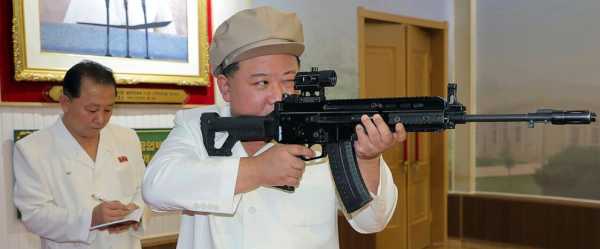
SEOUL, South Korea — North Korean leader Kim Jong Un toured the country’s key weapons factories, including those producing artillery systems and launch vehicles for nuclear-capable ballistic missiles, and pledged to speed up efforts to advance his military’s arms and war readiness, state media said Sunday.
Kim’s three-day inspections through Saturday came as the United States and South Korea prepared for their next round of combined military exercises planned for later this month to cope with the growing North Korean threat.
Tensions on the Korean Peninsula are at their highest level in years as the pace of North Korea’s missile tests and the joint U.S.-South Korea military drills, which Kim portrays as invasion rehearsals, have both intensified in a tit-for-tat cycle.
Some experts say Kim’s tour of the weapons factories could also be related to possible military cooperation with Moscow that may involve North Korean supplies of artillery and other ammunition as Russian President Vladimir Putin reaches out to other countries for support in the war in Ukraine.
During Kim's visit to an unspecified factory producing large-caliber artillery systems, he stressed the factory’s “important responsibilities and tasks in perfecting (the North’s) war readiness,” North Korea’s official Korean Central News Agency said.
Kim praised the factory’s efforts to employ “scientific and technological measures” to improve the quality of shells, reduce processing times for propellent tubes and increase manufacturing speed, but also called for the need to develop and produce new types of shells, KCNA said.
At another factory manufacturing launcher trucks designed to transport and fire ballistic missiles, Kim said increasing the supply of the vehicles is a top priority for the military and complimented workers for establishing a “solid foundation” for production.
At a factory producing engines for cruise missiles and drones, Kim called for “rapidly expanding” production, KCNA said. Kim’s stops also included a small arms factory, where he stressed the need to modernize the weapons carried by soldiers. Photos published by state media showed Kim firing at least two different scoped rifles from a table.
In the face of deepening confrontations with Washington and Seoul, Kim has been trying boost the visibility of his partnerships with Moscow and Beijing as he tries to break out of diplomatic isolation and insert himself into a united front against the United States.
His tour of the weapons factories comes after a giant military parade last month in North Korea’s capital, Pyongyang, where Kim was joined by Russian Defense Minister Sergei Shoigu and a Chinese ruling party official while rolling out his most powerful missiles designed to target South Korea and the United States.
Shoigu’s presence at the July 27 parade, which came after Kim took him on a tour of a domestic arms exhibition, demonstrated North Korea’s support for Russia’s invasion of Ukraine and added to suspicions the North was willing to supply arms to Russia to support its war efforts.
Cheong Seong Chang, an analyst at South Korea’s Sejong Institute, said Kim’s visits to the factories likely had a dual goal of encouraging the modernization of domestically produced weapons and examining artillery and other supplies that can possibly be exported to Russia.
Kim's comments at the artillery factory about improving the quality of shells and the need to develop new types of ammunition, which he described as key to the country's “defense economic projects,” clearly communicate an intent for exports to Russia, Cheong said.
North Korea has been aligning with Russia over the war in Ukraine, insisting that the “hegemonic policy” of the U.S.-led West forced Moscow to take military action to protect its security interests. But Pyongyang has denied U.S. accusations that it has been providing arms to Russia to aid its fighting in Ukraine.
Cheong said Kim’s comments at the factory about making missile-launch trucks could indicate that the North is seeing some progress in increasing the production of those vehicles, which would possibly improve the operational range of its ballistic weapons designed to target neighboring rivals and the U.S. mainland.
Sourse: abcnews.go.com






